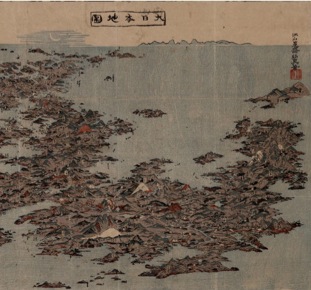




The goals for this course are twofold, but fundamentally linked: to improve Japanese language skills through reading and discussion of literary works in the original Japanese; and to gain a deeper understanding of Japanese literature, both in microcosm through learning to appreciate the distinctive literary qualities of individual works, and in macrocosm by examining the place of those works within Japan’s larger literary history. The course is designed to serve as a kind of capstone to your study of both language and literature over the course of your four years of study, helping to pull together the various threads and place what you have learned in a larger context.
As a language course, the primary focus will be on developing strategies for active reading, learning to scan longer texts for general meaning, using context to infer the meaning of unknown words and phrases , and fostering the ability to recognize what parts of a longer passage should be focused on and what may be ignored. Learning to read Japanese is a lifelong project, and this class is designed to give you the tools to pursue it effectively as you work through complex materials on your own. As a literature course, we will focus on both individual works and on their place in the larger literary context. It takes far longer to achieve a level sufficient to tackle Japanese literary works in the original language than it does for European languages, but by the fourth year you should be at a stage where you can go beyond simply deciphering meaning and learn to appreciate the literary qualities of Japanese texts. We will read works from many of the most important authors of modern and contemporary literature, drawing on your individual experiences in previous literature courses and expanding on them to create a framework in which to understand the authors. Both as a class and individually, you will conduct research into the authors and present your findings both orally and in writing.
The source material for the course will consist of short stories, excerpts from longer works, modern poetry in both traditional and modern forms, and brief essays, all in the original language. Primary sources in Japanese will be supplemented with works of literary criticism. In-class discussion will include discussion of both the content and style of original works and discussion of literary context, both as it is discussed in secondary readings and as they arise from our own interpretation of primary sources.
Evaluation will be on the following basis:
Attendance/Participation 10%
Daily Homework 20%
Annotation/Presentation 20%
Three Papers 3x10%= 30%
Take-home Final Exam 20%
• Attendance/Participation – Regular attendance is naturally expected, but active participation in class
discussion is also required for full credit
• Daily Homework – consists of both thorough reading of the texts to use in class and the preparation of
answers to targeted discussion questions for each reading
• Annotation/Presentation – annotation of assigned texts for use by the class and researching of an in-
class presentation on the author, work, and literary context.
• Three Papers – each paper will be 7-10 pages long and consist of 2-3 pages of polished translation of a
section from the work on which we had been working, with the remainder devoted to a critical analysis
of the significance of that section to the work, the author, and its time. Paper due dates are indicated on
the course schedule
• Final Exam – exam will be take-home, with free use of reference materials (with the exception of
existing translations if such exist) and will consist of unfamiliar Japanese literary passages to be
translated into English, accompanied by a brief explanation of what strategies were employed in the
translation and the reason for those decisions. The answers should both show advanced ability in
comprehending the written Japanese language and reflect an understanding of the way in which each
passage reflects the larger literary themes we have explored.
Course Schedule
Weeks One through Three
Yume Jûya (夢十夜) by Natsume Sôseki (夏目漱石)– Using annotated versions from from
Annotated Japanese Literary Gems and Breaking Into Japanese Literature
Secondary critical readings on Sôseki, the origins of modern literature in the Meiji period, and
major literary trends of the time
Week Four
• First paper due Monday
Modern Japanese poetry – various poems from Masaoka Shiki (正岡子規), Ishikawa Takuboku
(石川啄木), Yosano Akiko (与謝野晶子), Takamura Kotarô (高村光太郎), etc. and critical
works
Assign students individual works for annotation assignments (week 7-10)
Weeks Five and Six
Modern Japanese theater – excerpts from a modern Japanese play, TBA. Possible playwrights
include Kishida Kunio (岸田国士), Betsuyaku Minoru (別役実), Yamazaki Masakazu (山崎
正和), Kara Jûrô (唐十朗)
Weeks Seven through Ten
Each week a different student will be assigned a work for which to prepare the Annotation/
Presentation Assignment for Monday of that week.
•• Second paper for each student due two weeks after presentation date
Possible authors include Shiga Naoya (志賀直哉), Akutagawa Ryûnosuke (芥川龍之介),
Kawabata Yasunari (川端康成), Kôno Taeko (河野多恵子), Enchi Fumiko (円地文子),
Mishima Yukio (三島由紀夫), Abe Kôbô (安部公房), Ôe Kenzaburô (大江健三郎),
Murakami Haruki (村上春樹), Yoshimoto Banana (よしもとばなな)
Week Eleven and Twelve
One short story, excerpt, or essay each week, with students receiving the material in class on
Monday with no previous exposure and no prepared glossaries.. Authors to be chosen from
among those not assigned in weeks 7-10.
•• Third paper due on the last day of class
•• Take home exam to be handed out on the last day of class and completed by the end of the final
exam period





